 W
W"99 Luftballons" is a song by the German NDW band Nena from their 1983 self-titled album. An English-language version titled "99 Red Balloons", with lyrics by Kevin McAlea, was also released on the album 99 Luftballons in 1984 after widespread success of the original in Europe and Japan. The English version is not a direct translation of the German original and contains lyrics with a somewhat different meaning. In the US, the English-language version did not chart, while the German-language recording became Nena's only US hit.
 W
WThe Berlin Wall was a guarded concrete barrier that physically and ideologically divided Berlin from 1961 to 1989. Construction of the wall was commenced by the German Democratic Republic on 13 August 1961. The Wall cut off West Berlin from surrounding East Germany, including East Berlin. The barrier included guard towers placed along large concrete walls, accompanied by a wide area that contained anti-vehicle trenches, beds of nails, and other defenses. The Eastern Bloc portrayed the Wall as protecting its population from fascist elements conspiring to prevent the "will of the people" from building a socialist state in East Germany.
 W
WBillion-Dollar Brain is a 1966 Cold War spy novel by Len Deighton. It was the fourth to feature an unnamed secret agent working for the British WOOC(P) intelligence agency. It follows The IPCRESS File (1962), Horse Under Water (1963), and Funeral in Berlin (1964). As in most of the author's novels, the plot of Billion Dollar Brain (1967) is intricate, with many dead ends.
 W
WThe Bourne Identity is a 1980 spy fiction thriller by Robert Ludlum that tells the story of Jason Bourne, a man with remarkable survival abilities who has retrograde amnesia, and must seek to discover his true identity. In the process, he must also reason out why several shadowy groups, a professional assassin, and the CIA want him dead. The story takes readers on a twisted and dangerous journey into a world of deceptions and conspiracies, offering a psychological portrait of Bourne, and giving them the chance to experience from his point of view the life-or-death decisions he makes as he seeks to piece together the dangerous puzzle of his missing past. It is the first novel of the original Bourne Trilogy, which also includes The Bourne Supremacy and The Bourne Ultimatum.
 W
W"Burning Heart" is a song by Survivor. It was sung by Jimi Jamison and appeared in the 1985 film Rocky IV and on its soundtrack album. The single peaked at number 2 on the Billboard Hot 100 for two weeks in February 1986, behind "That's What Friends Are For" by Dionne and Friends. It was the biggest hit the band had with Jamison on lead vocals.
 W
WThe Central Intelligence Agency is a civilian foreign intelligence service of the federal government of the United States, officially tasked with gathering, processing, and analyzing national security information from around the world, primarily through the use of human intelligence (HUMINT). As one of the principal members of the United States Intelligence Community (IC), the CIA reports to the Director of National Intelligence and is primarily focused on providing intelligence for the President and Cabinet of the United States.
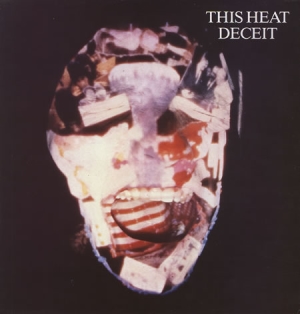 W
WDeceit is the second and final studio album by English experimental rock band This Heat, released in 1981 by Rough Trade Records. As with their self-titled debut album, the tracks on Deceit were assembled from largely improvised recordings that the band accumulated since their inception in 1976, with varying degrees of audio quality. However, it is generally considered to be more song-oriented than its largely abstract predecessor. The title is in part a pun on the band's name.
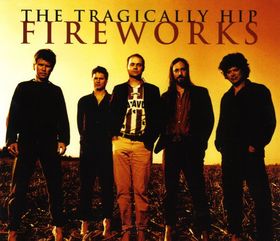 W
W"Fireworks" is a song by Canadian rock band The Tragically Hip. It was released in November 1998 as the third single from their sixth studio album, Phantom Power. The song was very successful in Canada, peaking at number 9 on Canada's RPM Singles chart.
 W
WThe GIUK gap is an area in the northern Atlantic Ocean that forms a naval choke point. Its name is an acronym for Greenland, Iceland, and the United Kingdom, the gap being the open ocean between these three landmasses. The term is typically used in relation to military topics. The area has been considered strategically important since the beginning of the 20th century.
 W
WThe Ipcress File is a 1965 British espionage film directed by Sidney J. Furie and starring Michael Caine. The screenplay, by Bill Canaway and James Doran, was based on Len Deighton's novel The IPCRESS File (1962). It received a BAFTA award for the Best British film released in 1965. In 1999, it was included at number 59 on the BFI list of the 100 best British films of the 20th century.
 W
WThe Iron Curtain was initially a non-physical boundary dividing Europe into two separate areas from the end of World War II in 1945 until the end of the Cold War in 1991. The term symbolizes the efforts by the Soviet Union (USSR) to block itself and its satellite states from open contact with the West and its allied states. On the east side of the Iron Curtain were the countries that were connected to or influenced by the Soviet Union, while on the west side were the countries that were NATO members or nominally neutral. Separate international economic and military alliances were developed on each side of the Iron Curtain. It later became a term for the 7,000-kilometre-long (4,300 mi) physical barrier of fences, walls, minefields, and watchtowers that divided the "east" and "west". The Berlin Wall was also part of this physical barrier.
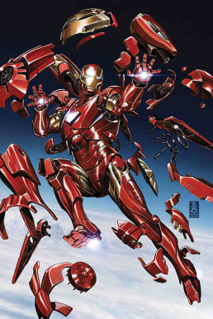 W
WIron Man is a fictional superhero appearing in American comic books published by Marvel Comics. The character was co-created by writer and editor Stan Lee, developed by scripter Larry Lieber, and designed by artists Don Heck and Jack Kirby. The character made his first appearance in Tales of Suspense #39, and received his own title in Iron Man #1. Also in 1963, the character founded the Avengers alongside Thor, Ant-Man, Wasp and the Hulk.
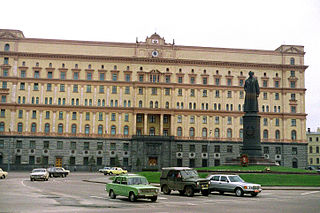 W
WThe KGB, translated in English as the Committee for State Security, was the secret police force that was the main security agency for the Soviet Union from 1954 until the dissolution of the Soviet Union in 1991. As a direct successor of preceding agencies such as the Cheka, NKGB, NKVD and MGB, was attached to the Council of Ministers. It was the chief government agency of "union-republican jurisdiction", carrying out internal security, intelligence and secret police functions. Similar agencies operated in each of the republics of the Soviet Union aside from the Russian SFSR, with many associated ministries, state committees and state commissions.
 W
WKGBeast is a fictional supervillain appearing in comic books published by DC Comics. Created by Jim Starlin and Jim Aparo, the character first appeared as an adversary of Batman.
 W
WMy God, Help Me to Survive This Fatal Attraction, sometimes referred to as the Fraternal Kiss, is a graffiti painting by Dmitri Vrubel on the eastern side Berlin wall. Painted in 1990, it has become one of the best known pieces of Berlin wall graffiti art. The painting depicts Leonid Brezhnev and Erich Honecker in a socialist fraternal kiss, reproducing a photograph taken in 1979 during the 30th anniversary celebration of the foundation of the German Democratic Republic.
 W
WHarry Palmer is the protagonist of a number of films based on the unnamed main character in the spy novels written by Len Deighton. Michael Caine played Harry Palmer in three of the four films based on the four published novels featuring this character. Caine also starred as this character in two other films not directly based on Deighton's novels.
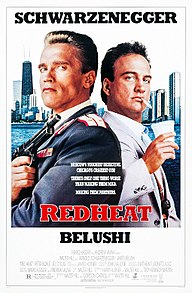 W
WRed Heat is a 1988 American action buddy cop comedy crime thriller film directed by Walter Hill. The film stars Arnold Schwarzenegger, as Moscow Militia Captain Ivan Danko, and Jim Belushi, as Chicago detective Art Ridzik. Finding themselves on the same case, Danko and Ridzik work as partners to catch a cunning and deadly Georgian drug kingpin, Viktor Rostavili, who also happens to be the killer of Danko's previous partner back in Soviet Russia.
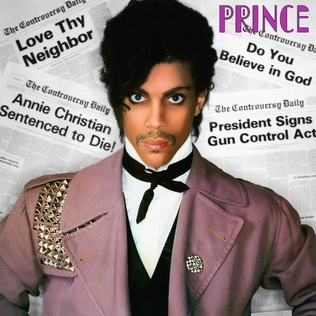 W
WControversy is the fourth studio album by American recording artist Prince, released on October 14, 1981 by Warner Bros. Records. It was produced by Prince, written by him, and he also performed most of the instruments on its recording. Controversy reached number three on the Billboard R&B Albums chart and was certified Platinum by the Recording Industry Association of America (RIAA). It was voted the eighth best album of the year in the 1981 Pazz & Jop, an annual critics poll run by The Village Voice.
 W
WShort Circuit is a 1986 American comic science fiction film directed by John Badham and written by S. S. Wilson and Brent Maddock. The film's plot centers upon an experimental military robot that is struck by lightning and gains a human-like intelligence, with which it embarks to explore. Short Circuit stars Ally Sheedy, Steve Guttenberg, Fisher Stevens, Austin Pendleton and G. W. Bailey, with Tim Blaney as the voice of the robot named "Number 5". A sequel, Short Circuit 2, was released in 1988, directed by Kenneth Johnson, but did not do as well at the box office.
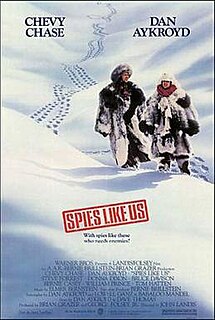 W
WSpies Like Us is a 1985 American comedy film directed by John Landis and starring Chevy Chase, Dan Aykroyd, Steve Forrest, and Donna Dixon. The film presents the comic adventures of two novice intelligence agents sent to the Soviet Union. Originally written by Aykroyd and Dave Thomas to star Aykroyd and John Belushi at Universal, the script went into turnaround and was later picked up by Warner Bros. with Aykroyd and Chase starring.
 W
WThe Spy Who Came In from the Cold is a 1963 Cold War spy novel by the British author John le Carré. It depicts Alec Leamas, a British agent, being sent to East Germany as a faux defector to sow disinformation about a powerful East German intelligence officer. It serves as a sequel to le Carré's previous novels Call for the Dead and A Murder of Quality, which also featured the fictitious British intelligence organization, "The Circus", and its agents George Smiley and Peter Guillam.
 W
WStrategic Air Command (SAC) was both a United States Department of Defense (DoD) Specified Command and a United States Air Force (USAF) Major Command (MAJCOM), responsible for Cold War command and control of two of the three components of the U.S. military's strategic nuclear strike forces, the so-called "nuclear triad", with SAC having control of land-based strategic bomber aircraft and intercontinental ballistic missiles or ICBMs.
 W
WTinker Tailor Soldier Spy is a 1974 spy novel by British author John le Carré. It follows the endeavours of taciturn, aging spymaster George Smiley to uncover a Soviet mole in the British Secret Intelligence Service. Since the time of its publication, the novel has received critical acclaim for its complex social commentary and lack of sensationalism, and remains a staple of the spy fiction genre.
 W
W"Wind of Change" is a power ballad by the West German rock band Scorpions, recorded for their eleventh studio album, Crazy World (1990). The song was composed and written by the band's lead singer Klaus Meine and produced by Keith Olsen and the band. The lyrics were composed by Meine following the band's visit to the USSR at the height of perestroika, when the enmity between the communist and capitalist blocs subsided concurrently with the promulgation of large-scale socioeconomic reforms in the USSR.
 W
WXPD is a spy novel by Len Deighton, published in 1981, and set in 1979, roughly contemporaneous with the time it was written. It concerns a plan by a group of former SS officers to seize power in West Germany, in which they intend to publish some wartime documents about a (fictional) secret meeting between Winston Churchill and Adolf Hitler in June 1940, and the efforts of a British agent, Boyd Stuart, to prevent the documents becoming public.